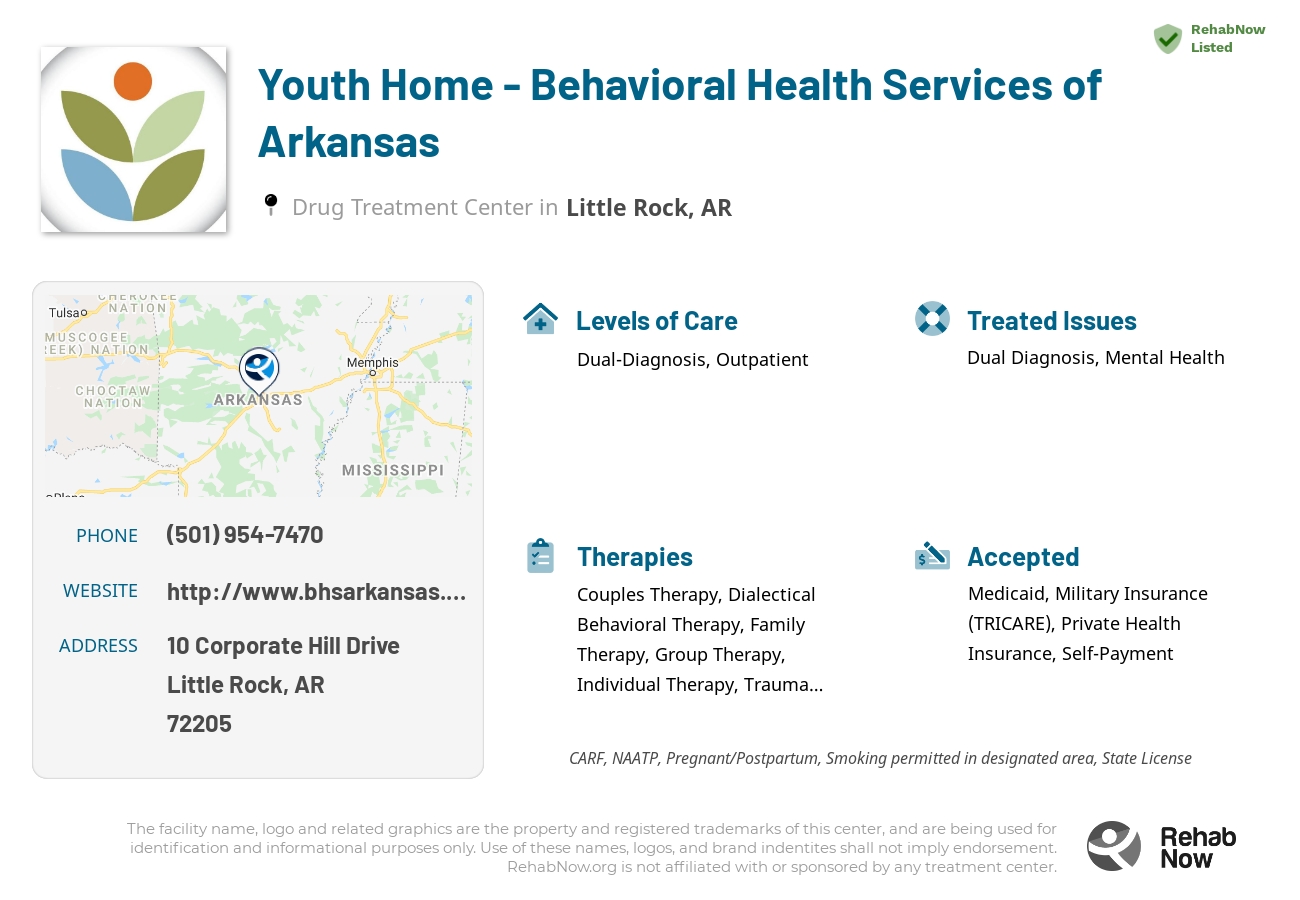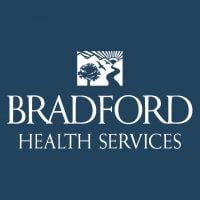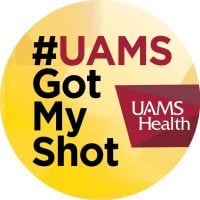Youth Home - Behavioral Health Services of Arkansas
Drug Rehab Center in Little Rock, Arkansas
Youth Home - Behavioral Health Services of Arkansas in Little Rock, Arkansas offers comprehensive behavioral health services, including addiction treatment and substance abuse, for adolescents and adults, with support for families and caregivers, tailored to individual needs, and accredited by the Joint Commission and National Association of Psychiatric Health Centers.
About Youth Home - Behavioral Health Services of Arkansas in Arkansas
Youth Home - Behavioral Health Services of Arkansas in Little Rock, Arkansas provides comprehensive behavioral health services, including addiction treatment and substance abuse, to both adolescents and adults. Its scope of services covers educational, psychological, and psychiatric care that is tailored to each individual's needs with a focus on integrating mental health and physical health care. It also offers family-focused, community-based services and 24/7 emergency care.
Youth Home - Behavioral Health Services of Arkansas offers a broad range of addiction treatment services, such as individual and group counseling, family therapy, medication-assisted treatment, and crisis intervention. It also provides assessments and referrals to necessary treatment programs and resources, as well as support and education for individuals and their families and caregivers. Additionally, patients can take advantage of the facility’s case management and discharge planning services.
Youth Home - Behavioral Health Services of Arkansas is privileged to be accredited by the Joint Commission and approved by the Arkansas Department of Human Services for Medicaid services. The facility also offers specialized programs for individuals with co-occurring mental health disorders, such as its Crisis Stabilization Treatment and Co-occurring Services program. Additionally, the facility has earned a National Association of Psychiatric Health Centers accreditation for its adult and adolescent services.
Genders
Ages
Modality
Additional
Conditions and Issues Treated
Levels of Care Offered
This center offers a variety of custom treatment tailored to individual recovery. Currently available are Dual-Diagnosis, Outpatient, with additional therapies available as listed below.
“Outpatient treatment is ideal for those who have a lower intensity addiction. It’s also suitable for those with a supportive environment and those on a tight budget.
Outpatient treatment can be considered the lowest intensity level of addiction treatment. It is ideal for early phase addiction or lower intensity addictions. It may involve weekly sessions instead of daily. Peer group support, 12-step programs, and individual counseling may still be used and anti-addiction medication.
Therapies & Programs
No single treatment works for all addicts; therefore, the goal of treatment and therapy should be to find what works best for each individual. Some people requiring addiction treatment may only need a few weeks of inpatient care. Others will require long-term residential care. Tolerance and withdrawal levels vary from person to person and thus affect the intensity of the treatment needed.
If an individualized approach to treatment and therapy is not offered, addicts may fail to reap benefits from their efforts. Professionals must customize plans according to their patient’s needs, limitations, and strengths. The goal of all forms of addiction treatment should be for addicts to find healthy ways to cope with their addiction and its underlying causes.
Couples therapy for drug addiction is a unique form of therapy that allows family members to work through the emotional issues of their loved one’s addiction together. Family members can support each other while learning how to cope with the addiction and encourage healthy changes.
Accordingly, couples therapy for drug addiction is designed for an addict and their significant other or spouse. The two will work with a therapist to learn how the addiction affects themselves and the relationship and how to break the negative patterns of behavior that may have developed.
Drug addiction can destroy a person’s life, as well as their family and friends. The loss of one’s ability to choose how to live and behave often leads the addict into depression, anger, guilt, and many emotional problems.
The therapies usually include siblings, children, and parents who are involved in their daily lives. These sessions are vital because they address past issues that may have hampered an addict’s or alcoholic’s recovery and provide support at a crucial time!
One of the most critical aspects of family therapy is helping addicts’ loved ones see their situation in a new light. It’s also one of the most challenging things a family can do when a loved one struggles with addiction or alcoholism.
Group therapy is held in a safe, controlled setting where patients can feel comfortable sharing their struggles and gaining perspective through shared conversations. It takes place in a group rather than one on one to prevent feelings of isolation or being unique in their situation while creating an environment for addicts at Youth Home - Behavioral Health Services of Arkansas to develop fellowship, accountability, and support. Group therapy is an important tool in recovery that prevents cravings that prompt a return to active addiction.
This type of therapy involves the use of a variety of therapeutic techniques to help addicts recover from past traumas that might have triggered their substance abuse. During these sessions, therapists will work with the addict to address painful memories and learn how to cope effectively with stressors as they arise.
During these types of sessions, therapists will typically focus on three main goals:
- Identifying and expressing painful emotions associated with past traumas.
- Reducing the effects of stress on an addict’s life by developing more effective coping mechanisms.
- Developing healthy ways of thinking about stressful situations that can help addicts avoid substance abuse issues in the future.
This type of therapy is typically used in conjunction with other types of addiction treatment services. By identifying and dealing with the root cause of addiction, most addicts can overcome their cravings and prevent relapse once they leave rehab.
Many different types of addiction treatment services exist to help addicts safely get sober, but it’s important for recovering individuals to find a therapist or support group that will help them address the root cause of their addiction.
Dialectical Behavior Therapy is a form of Cognitive Behavioral Therapy that helps patients understand the relationship between their thoughts, feelings, and behaviors. It is beneficial for those whose addictions and behaviors stem from severe mental health issues. It aims to help the patient achieve their goals and identify how they can enhance their lives.
Cognitive-behavioral therapy is a talking-based method that helps people struggling with addiction replace destructive behaviors with healthier ones. CBT also helps them identify the underlying thoughts and beliefs that cause these behaviors in the first place and ways to control those thoughts and feelings. It can be administered as a holistic therapy or as part of combination therapy and—as opposed to turning to drugs and alcohol—helps addicts learn how to respond to negative thoughts instead.
Payment Options Accepted
For specific insurance or payment methods please contact us.
Is your insurance accepted?
Ask an expert, call (888) 674-0062
Additional Details
Specifics, location, and helpful extra information.
Little Rock, Arkansas 72205 Phone Number(501) 954-7470 Meta DetailsUpdated November 25, 2023
Staff Verified
Youth Home - Behavioral Health Services of Arkansas Patient Reviews
There are no reviews yet. Be the first one to write one.
Little Rock, Arkansas Addiction Information
Arkansas has one of the highest rates of substance abuse and addiction in the nation for drug overdoses. Methamphetamines and prescription opioids are by far the most widely abused drugs in the state. Despite the high rates, Arkansas ranked only 25th in the for drug overdose deaths in 2013.
In Little Rock, Arkansas, there are approximately 1,000 people who are admitted to treatment centers for addiction to drugs or alcohol every year. There were 2,721 admissions to publicly funded alcohol and drug treatment programs in Little Rock in 2016. The most commonly reported drugs of abuse were methamphetamine (42%), heroin (26%), and alcohol (22%). Some popular treatment options include inpatient rehab, outpatient rehab, and detox centers.
Treatment in Nearby Cities
- Benton, AR (17.3 mi.)
- Fordyce, AR (64.9 mi.)
- Harrison, AR (109.9 mi.)
- Booneville, AR (91.0 mi.)
- Salem, AR (116.4 mi.)
Centers near Youth Home - Behavioral Health Services of Arkansas
The facility name, logo and brand are the property and registered trademarks of Youth Home - Behavioral Health Services of Arkansas, and are being used for identification and informational purposes only. Use of these names, logos and brands shall not imply endorsement. RehabNow.org is not affiliated with or sponsored by Youth Home - Behavioral Health Services of Arkansas.










